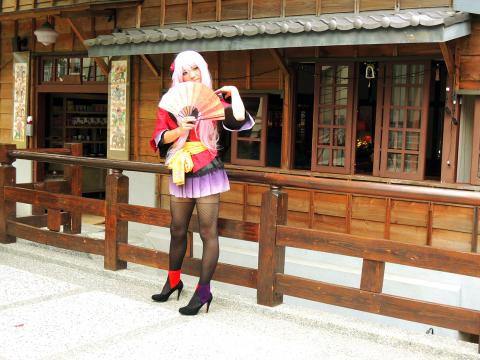A wooden building called Liuwu (柳屋) in Greater Tainan’s Jhongsi District (中西) has become a popular site for cosplay enthusiasts who like posing in costumes for pictures in traditional Japanese-style surroundings.
On weekends, small crowds of cosplay enthusiasts dressed as various Japanese manga characters can be seen posing for pictures in front of the Liuwu, or the Shihpamao Tea House, the name given it by its new operator, Yeh Tung-tai (葉東泰).
Cosplay, or costume play, is a type of performance art that originated in Japan in which participants wear costumes and accessories to portray a specific character, mostly from animations, caricatures or video games.

Photo: Meng Ching-tzu, Taipei Times
The city’s National Cheng Kung University has long been a famous gathering point for cosplay devotees in southern Taiwan, but it is gradually being overtaken by the Liuwu.
Yeh said that the Liuwu — a former dinning hall for the Japanese that was built around 1934 — was unlike other traditional Japanese-style structures whose wooden beams were normally left unpainted to preserve their original color and grain.
Brown paint was applied to the beams used to construct the Liuwu, Yeh said, mainly to help preserve the wood in Taiwan’s humid weather.
“To most Taiwanese, the Liuwu may appear to be no different from any other traditional Japanese building, but a Japanese could easily discern the subtle Taiwanese flavor incorporated in the building,” Yeh said.
While Tainan, a former capital of Taiwan, has a rich nostalgic atmosphere, it must be infused with an innovative spirit, rather than simply dwelling on the past, to keep pace with modern society, Yeh said.
In an effort to bring in innovations to his tea house, Yeh has launched a tea-tasting set featuring two pottery tea cups larger than ordinary ones. One is termed the “scent cup” (聞香杯), while the other is called the “sample teacup (品茗杯)” — affording customers a different experience of tea appreciation.
The scent cup, also known as the sniffle cup, is designed for tea enthusiasts to appreciate the aroma of infused tealeaves, while the sample teacup is used for drinking.

Chinese Nationalist Party (KMT) Chairman Eric Chu (朱立倫), spokeswoman Yang Chih-yu (楊智伃) and Legislator Hsieh Lung-chieh (謝龍介) would be summoned by police for questioning for leading an illegal assembly on Thursday evening last week, Minister of the Interior Liu Shyh-fang (劉世芳) said today. The three KMT officials led an assembly outside the Taipei City Prosecutors’ Office, a restricted area where public assembly is not allowed, protesting the questioning of several KMT staff and searches of KMT headquarters and offices in a recall petition forgery case. Chu, Yang and Hsieh are all suspected of contravening the Assembly and Parade Act (集會遊行法) by holding

PRAISE: Japanese visitor Takashi Kubota said the Taiwanese temple architecture images showcased in the AI Art Gallery were the most impressive displays he saw Taiwan does not have an official pavilion at the World Expo in Osaka, Japan, because of its diplomatic predicament, but the government-backed Tech World pavilion is drawing interest with its unique recreations of works by Taiwanese artists. The pavilion features an artificial intelligence (AI)-based art gallery showcasing works of famous Taiwanese artists from the Japanese colonial period using innovative technologies. Among its main simulated displays are Eastern gouache paintings by Chen Chin (陳進), Lin Yu-shan (林玉山) and Kuo Hsueh-hu (郭雪湖), who were the three young Taiwanese painters selected for the East Asian Painting exhibition in 1927. Gouache is a water-based

Taiwan would welcome the return of Honduras as a diplomatic ally if its next president decides to make such a move, Minister of Foreign Affairs Lin Chia-lung (林佳龍) said yesterday. “Of course, we would welcome Honduras if they want to restore diplomatic ties with Taiwan after their elections,” Lin said at a meeting of the legislature’s Foreign Affairs and National Defense Committee, when asked to comment on statements made by two of the three Honduran presidential candidates during the presidential campaign in the Central American country. Taiwan is paying close attention to the region as a whole in the wake of a

OFF-TARGET: More than 30,000 participants were expected to take part in the Games next month, but only 6,550 foreign and 19,400 Taiwanese athletes have registered Taipei city councilors yesterday blasted the organizers of next month’s World Masters Games over sudden timetable and venue changes, which they said have caused thousands of participants to back out of the international sporting event, among other organizational issues. They also cited visa delays and political interference by China as reasons many foreign athletes are requesting refunds for the event, to be held from May 17 to 30. Jointly organized by the Taipei and New Taipei City governments, the games have been rocked by numerous controversies since preparations began in 2020. Taipei City Councilor Lin Yen-feng (林延鳳) said yesterday that new measures by